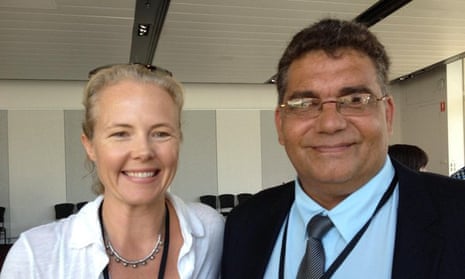The rates of major crime, domestic violence and drug offences have all dropped in the far western New South Wales town of Bourke, five years on from a groundbreaking, community-led campaign to address the underlying causes of crime.
Bourke is one of the most disadvantaged communities in Australia, with high long-term unemployment and family violence, and the highest rate of juvenile convictions in NSW.
The Maranguka project is a local initiative, the largest of its kind in Australia, based on redirecting the resources spent on policing and punishment to projects that help prevent offending behaviour.
Figures released on Monday by Maranguka show that in Bourke between 2015 and 2017 rates fell by:
18% for major offences
34% for non-domestic violence related assaults
39% for domestic violence related assaults
39% for drug offences
35% for driving offences
Rates of reoffending also dropped significantly. There was a 72% reduction in the number of people under 25 arrested for driving without a licence.
A key initiative under the Maranguka project has been to help more than 200 mostly young people obtain a driving licence. Eight off-duty police officers volunteered in the licensing program, “helping young learner drivers get their hours up,” Inspector Andrew Hurst of Bourke police said.
While he couldn’t pinpoint the causes, Insp Hurst said there had been a noticeable improvement over the past 12 months, as collaboration between the community and police has increased.
“We’re working a lot more closely around youth engagement and family violence. The closer we work together the better,” he said.
“The collaboration is geared to problem-solve rather than us using arrest as the only tool in the kit.”
Insp Hurst said it’s his third time in Bourke since being stationed there as a young constable in the 1990s, and “things have changed significantly since then.”
“We have more ability to connect services to people who need them, rather than arresting people who have underlying issues.”
The emerging evidence is confirming that justice reinvestment initiatives “empower communities to develop local solutions to our local issues,” Maranguka executive director Alistair Ferguson said.
“Our experience in Bourke demonstrates that governments should be getting behind justice reinvestment initiatives in other communities.”
Ferguson and Just Reinvest NSW were among a coalition of more than 35 human rights, justice and community organisations who wrote to the federal government last month, pleading for action on the rising numbers of Indigenous people in prisons.
They called on the government to respond to the recommendations of the Australian Law Reform Commission’s Pathways to Justice report, which was tabled in parliament more than six months ago.
The report recommended that the government establish a national justice reinvestment body, support justice reinvestment trials around the country, and develop national criminal justice targets.
The former attorney general George Brandis commissioned the report in 2016, saying the over-representation of Indigenous people in jail was a “national tragedy”.
Maranguka began in 2013, when members of the Bourke Aboriginal community approached Just Reinvest NSW.
A community strategy for change was developed and began in 2015, guided by the Bourke tribal council and supported by philanthropic and corporate partners.
The chairwoman of Just Reinvest NSW, Sarah Hopkins, said it was time for governments to fund justice reinvestment.
“Over previous decades, we have seen the imprisonment rates of Aboriginal and Torres Strait Islander men, women and children increasing dramatically,” Hopkins said.
“The experience in Bourke demonstrates that the solutions to this national crisis lie in community-led initiatives.
“We need to build communities, not prisons.”
